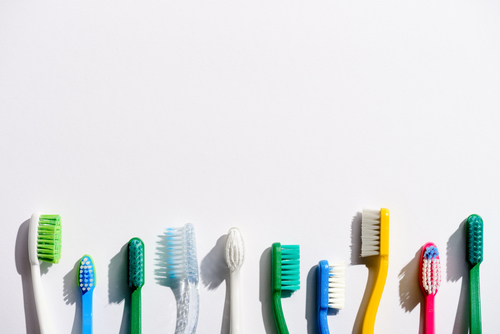What’s The Best Way to Floss
We all know we should floss, but it can be tough. Part of this is because flossing can feel like an extra task in an already busy day, but it...

Any time you find yourself wandering down the oral health care aisle of a store, you probably become immediately overwhelmed at all of the options. After all, with so many different ones, how are you supposed to feel completely confident in knowing you selected the right toothbrush for you?
This helpful guide to choosing your ideal toothbrush will have you selecting with confidence the next time you’re in need of a new toothbrush – which is every three months!
There is nothing more important than great oral hygiene. Did you know that gum disease is one of the significant risk factors for developing chronic health conditions, such as diabetes and heart disease?
The right toothbrush helps keep your teeth and gums healthy by:
The very best toothbrush for patients with gingivitis is one with very soft bristles. A toothbrush that is specialized to reach under the gum line and into the sulcus where the plaque accumulates is ideal. A smaller brush head also enables cleaning in the gingival sulcus itself, to sweep away dental plaque. An ultra-soft bristled brush forms a reduced contact area with the gums to not irritate sensitive gums further.
If you have been diagnosed with periodontal disease, you already have an indication of bone loss in between and around your teeth. Whether mild or advanced, a toothbrush that allows you to reach below the gumline effectively.
Keeping your teeth clean with braces can be difficult. Brackets and wires make it hard to clean around, and tight spaces can quickly become pockets for food debris to hide. An extra-soft toothbrush with cross-action bristles helps patients with braces or crowded teeth get a tremendous overall clean.
Anyone with a removable mouth appliance should still be brushing daily to keep them free of germs and bacteria that can easily be trapped between the appliance and your teeth. Investing in a denture-specific brush with two sides – a single-tufted head for hard-to-reach areas, and flat bristles for removing plaque and debris from surfaces. A denture-specific brush is a commonly used tool and is the perfect way to take care of your appliances.
Somewhere between 6-10 months, you can expect to see baby’s first tooth start to poke through their gum tissue. As soon as that first tooth emerges, you should be using a toothbrush to clean baby’s teeth and gums properly. Baby teeth are susceptible to tooth decay, so getting baby used to an oral hygiene routine early on helps them understand the importance from the beginning.
A baby gum brush. Cleans an infant’s gums before their first teeth emerge. Many gum brushes fit on your finger and don’t need toothpaste for a good clean.
Teether toothbrush. A nubby teether can help to keep baby’s mouth clean. A teether doesn’t need toothpaste and cleans the teeth on their own when the baby chews on it.
Baby’s first toothbrush. Use an infant-specific tiny toothbrush with extra-soft bristles. Use a baby toothbrush in addition to a rice-grain-sized dab of fluoride toothpaste.
Electric toothbrushes for baby or toddler. Like an adult electric toothbrush, they can do much of the scrubbing work for you. An electric toothbrush helps to make brushing more fun for children who are otherwise apprehensive about the brushing process.
An electric toothbrush and a manual toothbrush both work equally well to clean your teeth. However, a powered toothbrush might help you ditch some of your poor brushing habits – like not brushing for a full two minutes or failing to brush hard-to-reach places. Electric toothbrushes provide the cleaning action for you, and many people with limited mobility conditions, like arthritis, find using an electric toothbrush more comfortable to use than a manual toothbrush.
Whether you select a toothbrush that does it all, or if you choose a simple soft-bristled brush, it’s important to remember that brushing alone isn’t enough. Flossing helps to fight gum disease and cavities between your teeth, and seeing your dentist for regular professional cleanings helps to keep your smile healthy and bright.
Schedule your next dental exam with Hoffman Dental today and ask us about a personalized toothbrush recommendation.